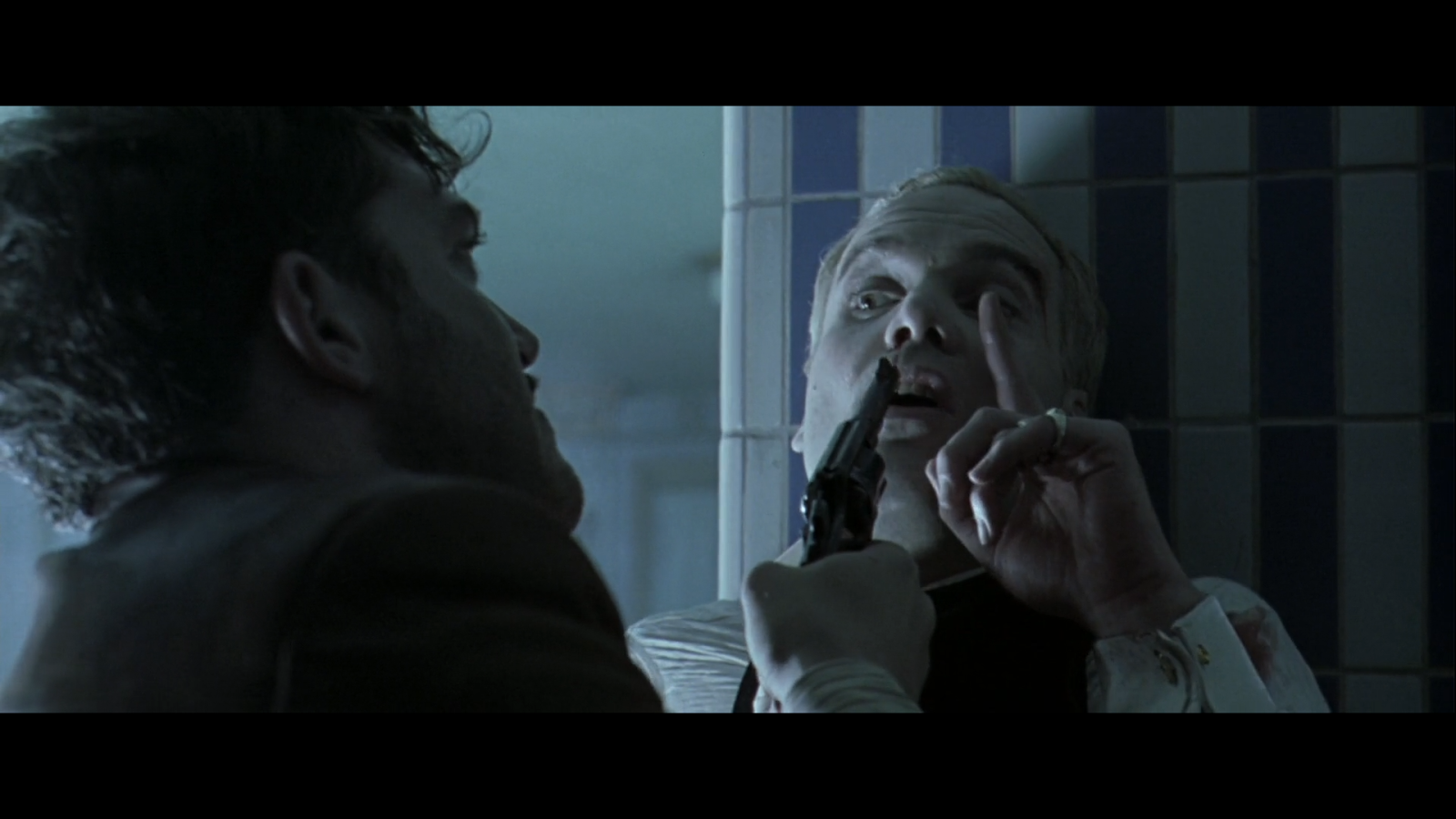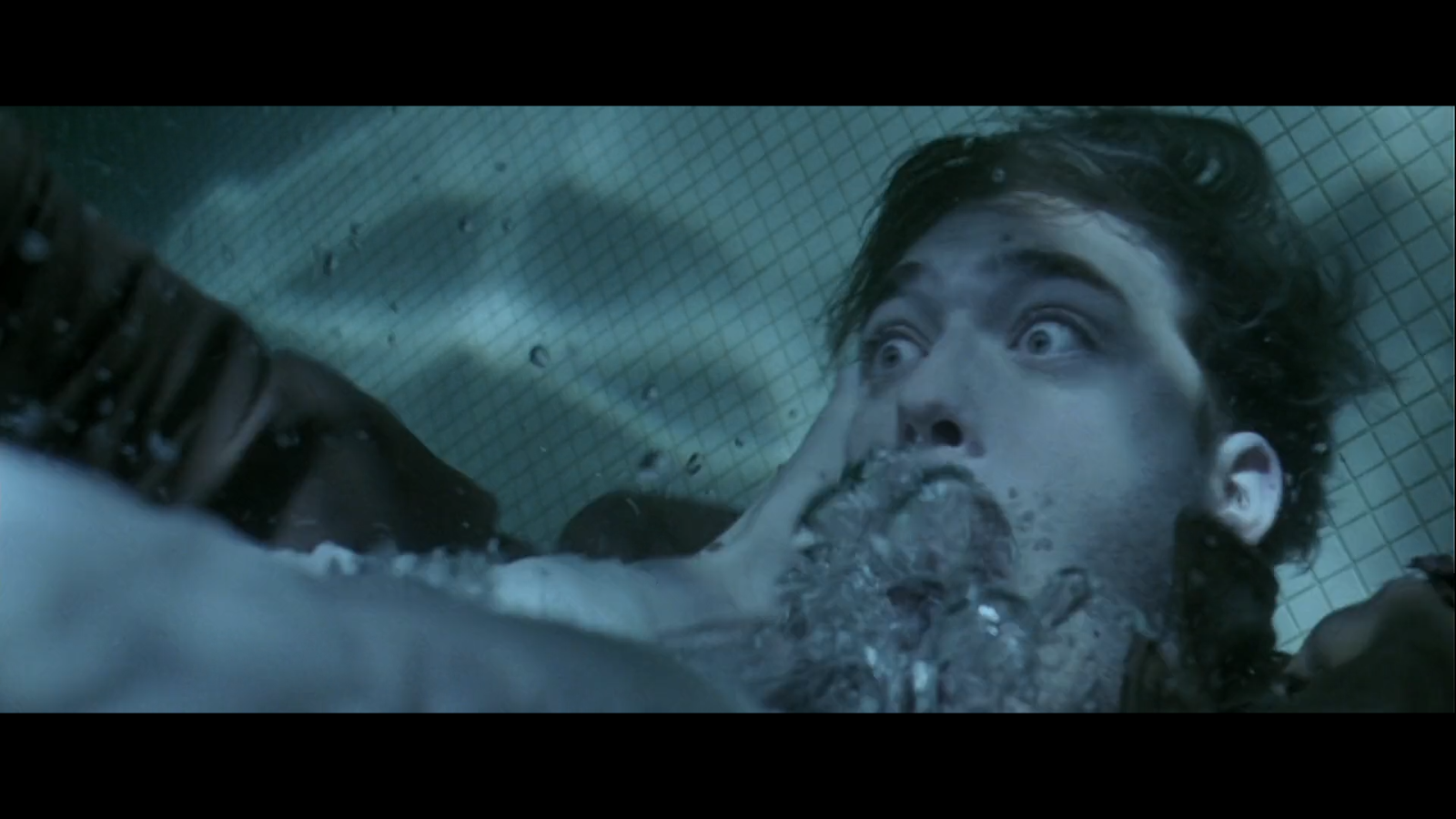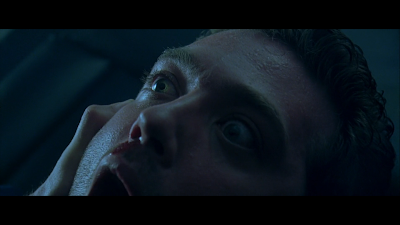The Thirteenth Floor (1999) by Josef Rusnak is an unfairly ignored existential scifi with a secret, cryptic alternative plot espousing the reality of trans-dimensional non-human-intelligences/spirits/gods and humanity's identity therewith.
The official plot is a contrived tale about VR programmers (users) possessing simulated humans (program links) to live out their darkest fantasies, resolving with our simulated hero defeating his user and escaping to an idealised 'real world'. But that's just the cover story.
To decrypt the secret message we have to suppose that there is no such thing as separate 'users' and 'sims'. Rather, there are simply higher and lower dimensional manifestations of the same conscious entities on an eternal quest for transcendance.
The relationship between Hall (the user) and Ferguson (the sim he 'possesses') should be understood as analogous to the relationship between me and my little toe. We're not identical, but my toe is nonetheless me. When Hall 'possesses' Ferguson it is like me focussing my attention on my toe.
The film opens with Rusnak speaking direct to his audience as Fuller, the creator of our simulated world. He has uncovered a terrible truth, and is writing it down for the only person (us) who could ever understand it.
Fuller deposits his letter containing the secret knowledge with the bartender, Ashton, exits the simulation, and is promptly murdered by our hero, Hall, supposedly under possession by the villain from the real world, David.
Hall awakes with no knowledge of the murder he is now accused of by the cop, McBain, who comments 'You could be home already'. In the official narrative McBain is merely quoting a real estate advert. In the cryptic plot McBain is pointing out that all dimensions are equally real, and choosing not to transcend to the next dimension is just as valid as its opposite. Since the real 'you' exists across all dimensions you are already home wherever you are.
But Hall is a seeker, so he jacks into the simulation. He 'possesses' Ferguson, abandons his job as a bank-teller, and tracks down Fuller's secret message. What's essential here is to remember that Ferguson is not really 'possessed' here - we have to understand his actions as being the result of Ferguson temporarily connecting with his higher-dimensional self (Hall).
Enlightenment
From this perspective Ferguson/Hall is experiencing his first epiphany. He has suddenly realised his true spiritual higher self, and sees the world anew. In the surface-level story Hall (as Ferguson) is awed by the fidelity of the simulated world he's jacked into. But in the cryptic story Ferguson/Hall has suddenly recognised the magnificence and wonder of the world he has always inhabited. He literally sees it with new eyes.
Ferguson/Hall now sees his world as a game, while the unenlightened NPCs of his former life can only see it as their complete reality, and his sudden change in personality as an existential threat. This precisely mirrors the real experience of personal enlightenment, where connection to a higher reality seems to those around us to be only madness.
Ferguson/Hall tracks down Ashton, a morally dubious bartender/pimp who has read the secret knowledge. Ferguson/Hall has the naivete of a freshly born soul and fails to recognise that Ashton knows more than he, and is manipulating him in order to keep the secret knowledge for himself.
Our hero thus arrives at his first trial. He has seen the beauty of existence, but is unprepared for the 'evil' forces which are a necessary condition of that beauty. Ashton tries to distract him with temptation by offering him sex, whereupon Ferguson collapses, and Hall exits the simulation, leaving Ferguson to wonder what the hell just took over him.
Back in Hall's reality Ashton's higher self Whitney (the programmer) tells him an error has caused his and Ferguson's memories to overlap. The interaction between Whitney and Hall mirrors the simultaneous interaction between Ashton and Ferguson (Whitney serves Hall a drink), and later we see Hall has taken up smoking, a Ferguson habit.
In these ways Rusnak makes clear the veracity of the cryptic interpretation of his film. We shouldn't understand users as separate from their sims, but as trans-dimensional instantiations of the very same consciousness. What happens to Hall and Whitney also happens to Ferguson and Ashton.
Hall and Whitney go on to discuss the situation. Whitney was 'afraid [he'd] be shooting hoops with Ferguson the rest of [his] life'. Hall says of the lower dimensional people (sims) 'they're just like us'. They are both appalled to learn that Fuller was using the sim to 'have sex with girls'.
Imagine for a moment that Ashton and Ferguson had somehow escaped their world and possessed Whitney and Hall. In that case these conversations would make just as much sense. Ashton and Ferguson are cooperating to understand the higher spiritual realm of which they've gained a brief glimpse.
Some more stuff happens in support of the cryptic interpretation - eg the same song from the simulated club plays in Hall's world, and he dances to it with a proficiency which clearly belongs to Ferguson - before Hall jacks back in.
This time he finds Fuller's lower-dimensional self, Grierson, who has dim recollections of being connected with Fuller and visiting the club. Ferguson/Hall takes him to the club to identify who he gave the secret letter to, and pursues Ashton/Whitney to the basement.
It's worth highlighting the nature of this experience for Grierson. He has lived with these disruptive, semi-real fantasies of abandoning his wife to have sex with girls at the club, and now a stranger takes his hand and shows him a level of reality and power which must be essentially mystical.
In the cryptic metaphor, Grierson is much less progressed in his journey towards transcendence. Until Ferguson/Hall shows up he is in denial about the reality of his sexual fantasies. And until the hand of fate forces him to confront this deep and dark element of his psyche it will continue to torment him.
Just as 'users' with mystical knowledge interact with lower-dimensional sims, our own higher-dimensional selves - ie the universe itself - reaches out to us in mysterious and ephemeral ways, via the world and people around us. The only choice we have is whether we're prepared to take its hand.
Evil & The Devil
Down in the basement Ashton/Whitney confronts Ferguson/Hall, whereupon the latter claims 'My name is Ferguson, I'm a bank-teller.' This is supposed to be a ruse by Hall to avoid conflict - but it is also the truth. If Ferguson, like Ashton, were not possessed by a separate 'user' but was instead genuinely trying to figure out the nature of reality his actions would not necessarily be any different.
Ashton/Whitney is unconvinced, and demands Ferguson/Hall reveal their true self. This interaction mirrors conflicts in our own 'real world' relationships, which are always a never-ending quest to break down our own ego-driven pretence - our playing of social roles - in order to get at the 'real' person behind them. This ambition will always be just beyond our reach, since complete knowledge of another person is only possible if we ARE that person.
Ashton/Whitney reveals his understanding of the secret knowledge. It spurred him to explore the limits of his world, whereat he concluded that what he thought was reality is just a mirage, and he's determined to break through to the higher reality which defines it.
On the surface this limit is represented as a physical, spatial end point, but metaphorically Ashton is recognising and rejecting the spiritual and philosophical limits he's accepted unquestioningly in his life, imposed by those who understand reality more fully - the users who programmed his world, namely Fuller, Hall and Whitney.
Ashton - by disobeying every value he's been taught - has learned that there is no meaning in life, there is no concrete moral code, there is no purpose and there is no truth.
A tussle ensues, and Ferguson/Hall gets the upper hand. This scene represents our hero's second existential trial, wherein he finally recognises and confronts the devil in Ashton/Whitney. He has the opportunity to shoot and thus defeat the devil, but he wants answers more than he wants security. We all have a choice in life of where to settle - you could be home already - and the truth always comes with a price paid in experiential stability.
Ashton/Whitney/TheDevil blows a kiss. Just like the snake in the garden of eden, his continued existence depends on our eternal desire for more of what he has to offer. He holds up a finger as if to request a pause in the conflict, then points down to the pocket from where he withdraws the letter - but in the cryptic interpretation he's recognising the choice the hero is making between heaven and hell, or higher and lower dimensions.
Ferguson/Hall then pays the price for his curiosity. The letter containing the secret knowledge falls into a swimming pool, unread, and he himself is drowned by Ashton/Whitney. This metaphor is particularly clever.
On one hand we already have the secret knowledge, since Ashton already told us. The great secret of life has always been known to all of us: that conflicts exist to be conquered, but conflict itself (the devil, if you prefer) can never be beaten; that the meaning of life is simply to live it.
On the other hand we have to take it on faith that Ashton was telling the truth; the objective contents of the secret letter can never be proved, and it will always be beckoning us from the bottom of a pool unfathomably deep.
Either way the film makes clear: spiritual transcendence has no finish line besides god, and god also just happens to be the starting line which triggers the race.
Hall awakes with Whitney's hands around his throat, just as Ashton's hands were around Ferguson's. Both characters have now transcended, and there is no longer any meaningful difference between Ashton and Whitney, nor Ferguson and Hall.
Ferguson exclaims, 'This whole project, this experiment, we're screwing with peoples' lives!'. Ashton argues: 'You're talking crazy, man, I know you just had a really bad fucking trip but try-' Ferguson interrupts: 'A fucking trip?! These people are as real as you and me!'
Ashton retorts: 'That's because we designed them that way, but in the end they're just a bunch of electronic circuits!' And Ferguson concludes: 'I'm shutting this bad fucking trip right down.'
The Secret Knowledge
Finally the core existential conflict materialises - and immediately dissolves. Ferguson empathises with the lower-dimensional beings - as above, so below - but his conclusion is that they should kill them all to save them from suffering.
Ashton disagrees. To him the entire world is unreal, a game to be played, and perversely his psychopathy drives him to protect that world.
This conflict mirrors Albert Camus when he writes: “There is but one truly serious philosophical problem and that is suicide. Judging whether life is or is not worth living amounts to answering the fundamental question of philosophy. All the rest — whether or not the world has three dimensions, whether the mind has nine or twelve categories — comes afterwards. These are games; one must first answer.”
The surface plot of The Thirteenth Floor wants us to take this conflict seriously as a battle between good and evil, and between the superiority of higher realities. But the encrypted truth tells us that both perspectives are true, and life is what happens within the foam that boils up from the conflict.
Ferguson/Hall next discovers the physical and spiritual limits of the world he thought was real, just as Ashton did in the lower realm. But unlike Ashton this drives him to a deep depression. What is the point of living, he wonders, is something outside his control can decide if he lives or dies?
Ferguson/Hall is confronted by Jane - his love-interest from a higher dimension - with the truth that it was he who killed his father-figure, Fuller. Again this mirrors the transcendental experience of accepting the pain that comes with self-understanding.
Ferguson/Hall has always denied his responsibility for the murder, while paradoxically recognising the insurmountable evidence against him. The Fuller/Father/God character did his best - despite the devil inside him which lusted after young girls - to teach his son (Ferguson/Hall) how to live.
But Ferguson/Hall wasn't ready to hear it, and without knowing why was driven to attack his creator. To transcend to the next level he has to accept the harm he's caused, and forgive himself for it.
Here's where it gets spicy. Jane is quick to offer a new narrative which promises to easily absolve Ferguson/Hall of his responsibility. This is the official wikipedia narrative wherein Hall was possessed by his evil user, David, and forced to commit the murder.
The cryptic truth is that Ferguson is Hall is David. Hall was never forced or possessed. Hall simply connected with an incomprehensible higher-dimensional force, of which he is a part, and did something he couldn't understand. To transcend he must accept his actions as his own - he must learn to identify with the entirety of what is, not just the ego he inhabits.
But it's looking bad for Ferguson/Hall. He buys Jane's story, complains that his reality is inferior to and under the control of the next one up, and tells Jane that David (his user) is 'a much better catch'.
The next scene is hands down the most perfect in the movie. Whitney jacks in, possessing Ashton as he drives a kidnapped Ferguson, causing him to crash and get arrested. What's brilliant is that it's impossible to prove whether Ashton or Whitney is in charge at the time (spoiler: it's both).
The character slurs his words and is fully nonchalant about getting arrested for kidnapping. Is it Whitney playing like it's all a game, or is it Ashton being drunk and reckless? When the character unplugs we're supposed to believe Ashton has possessed Whitney. He fumbles with the high-tech keycard door.
But this fumbling and the ensuing scenes could just as well be Ashton trying to escape from prison in the sim. And while Ashton/Whitley is fully absorbed by the wonder of the new world he inhabits, Ferguson/Hall is bereft.
As I pointed out earlier, the true conflict here is how Ashton and Ferguson react when faced with the lonely impossibility of true knowledge and control. Ashton takes it as carte blanche to enjoy playing by whatever rules he prefers. Ferguson takes it as good reason to turn the whole thing off.
Ashton pursues Ferguson with a gun. In the higher reality Hall sits clutching his hands in a finger gun. Both layers of reality are happening at the same time. Ashton is Whitley, as Ferguson is Hall is David.
The End is the Beginning is the End...
In the surface story the murderous David now possesses Hall, kills Whitley, and tries to kill Jane. It's noteworthy that at all times when a user is supposedly possessing someone they act as if death in that reality really matters. If users are separate from their lower-dimensional selves then death shouldn't concern them.
Just then McBain shows up at Jane's behest and kills Hall/David. We're lead to believe that Hall then possesses David in the higher dimension and lives with Jane and Fuller happily ever after. I see why this movie got bad reviews from critics only following the surface plot!
Rusak of course leaves entirely unspecified who it is that wakes up in Ferguson/Hall/David's body, or whether he's reached the top level of reality. Given what we know, he certainly hasn't.
The base medium of reality is a single consciousness which divides itself so as to dream of adventure, love and self-understanding. The spiritual unity we strive for and the pain we feel along the way are essential parts of the same system.
If my little toe becomes gangrenous I will cut it off. This isn't an exercise of control by me of an inferior being, any more than the pain my gangrenous toe causes me is an assault by an evil predator.
Perhaps it will turn out quite soon that huge parts of our lives are decided by all-powerful and invisible aliens. Perhaps there are angels and demons doing their work through us. Perhaps we're a simulation.
As Camus said, none of that matters (despite being a fun distraction). Plato had his Forms, Jung his Archetypes, religion its Gods. Whether instantiated by aliens, demons, social structures or individuals, we are all higher-dimensional beings playing the game of love versus hate.
There is no end goal in the race for spiritual transcendence. There's always a bigger fish. Ashton reminds us that there's value in the chase. Ferguson reminds us that winning isn't the goal.
To transcend we have to somehow live as if everything matters, but it's only a game. Easy come, easy go.
Easy come, easy go.
That's the way, if love must have its day.
Then as it came, let it go.
No remorse, no regret.
We should part exactly as we met.
Just easy come, easy go.
We never dreamt of romantic dangers.
But now that it ends, let's be friends and not two strangers.











No comments:
Post a Comment